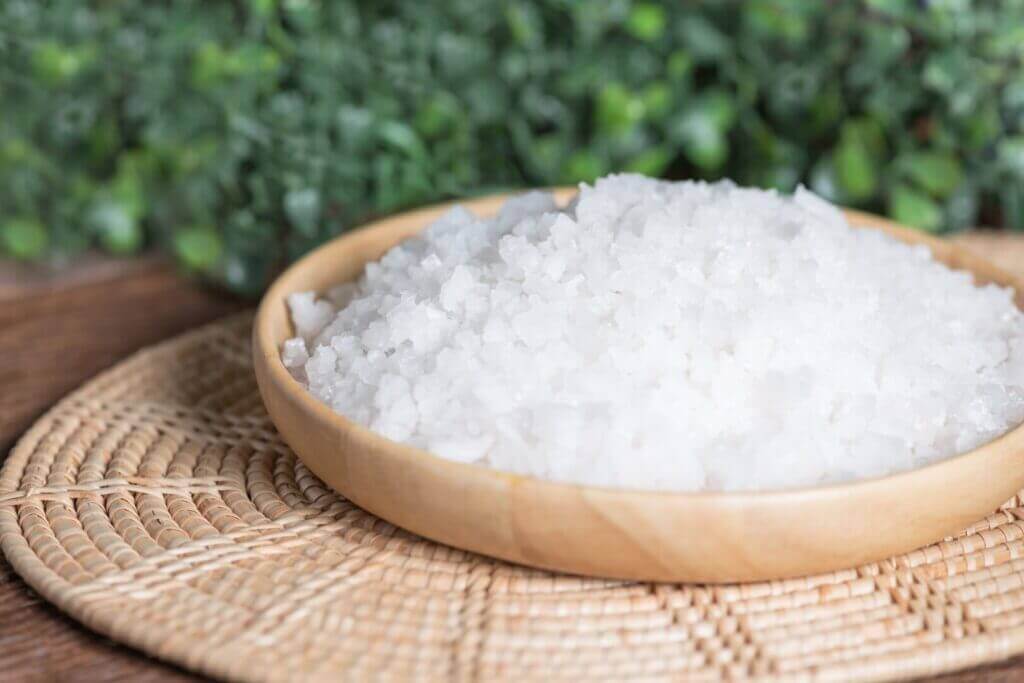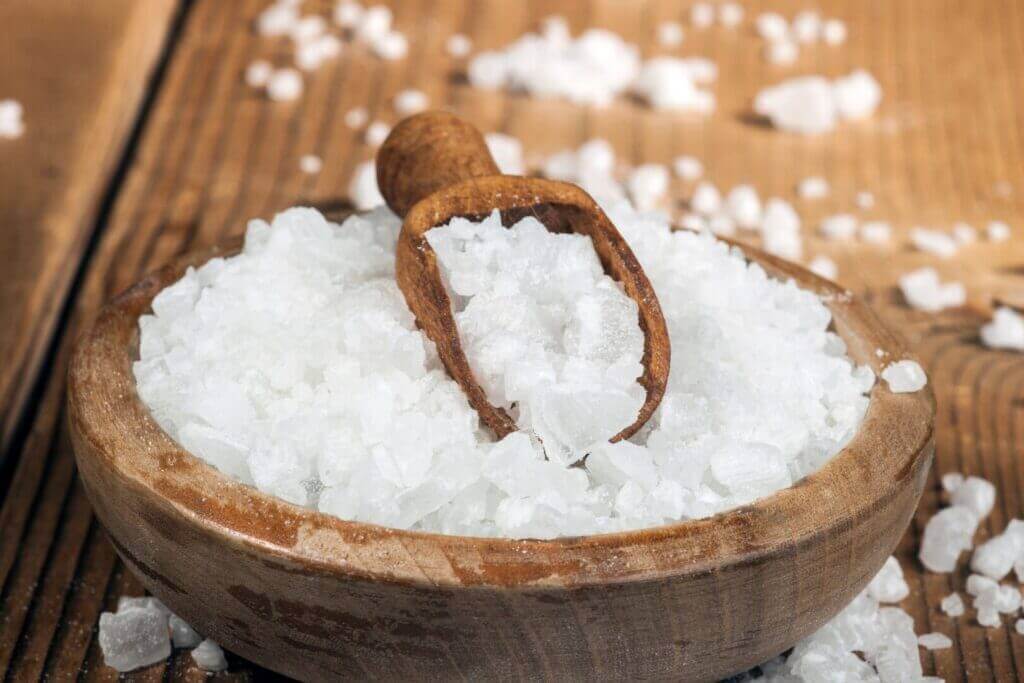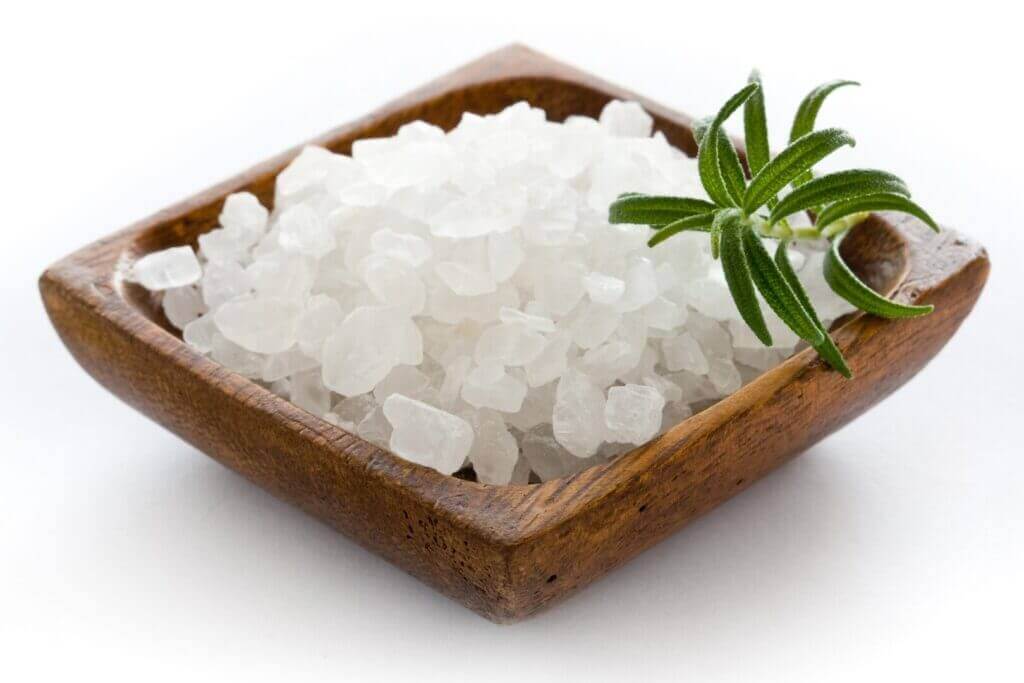
Vitamin E – An Essential Ingredient of Potency
Potency No. 710 embraces nature and self-care, combining the two into an easy-to-adopt regimen. The exquisite line of products offered
Epsom salt, or magnesium sulfate heptahydrate, has been a staple in households and spas alike for centuries. Known for its myriad benefits, from soothing sore muscles to enhancing beauty routines, Epsom salt is as versatile as it is beneficial. Let’s take a deep dive into the fascinating journey of Epsom salt. We will explore its scientific properties, historical origins, and modern-day uses, particularly in skincare.

Epsom salt was discovered in the early 17th century in the town of Epsom, England. It was discovered by a cattle farmer named Henry Wicker. Legend has it that Wicker noticed his cows avoided drinking water from a specific well due to its bitter taste. Upon investigation, he discovered that the water had high concentrations of magnesium sulfate. Later finding it to have beneficial effects on wounds and rashes. The mineral-rich waters of Epsom quickly became renowned for their healing properties, attracting people from far and wide seeking relief from ailments. By the 18th century, Epsom salts were commercially produced for medicinal and household use.

From its humble beginnings in a small English town to its widespread use in modern-day health and beauty routines, Epsom salt has proven to be a versatile and beneficial addition to any skincare regimen. Whether you’re looking to exfoliate, detoxify, or simply add a touch of luxury to your bath, Epsom salt is a time-tested remedy that continues to stand the test of time.
Epsom salt is also a star ingredient in many luxurious spa treatments. Spas around the world incorporate Epsom salt in their therapies, from body scrubs to foot soaks, recognizing its potential to enhance relaxation and beauty. The mineral-rich baths not only soothe the body but also provide a serene experience that rejuvenates the mind.
Here’s how to use Epsom salt and what it brings to skincare routines:
The coarse texture of Epsom salt makes it an effective exfoliant. It gently removes dead skin cells, revealing smoother, more radiant skin underneath. Regular exfoliation with Epsom salt can also help prevent clogged pores and acne, making it a valuable addition to any skincare routine.
Epsom salt baths help draw out impurities from the skin, leaving it feeling rejuvenated. The process of osmosis allows the magnesium and sulfate ions to penetrate the skin. This promotes the elimination of toxins and heavy metals. This detoxifying effect leaves your skin feeling clean and refreshed.
Magnesium in Epsom salt has anti-inflammatory benefits, making it ideal for calming irritated skin and reducing redness. Whether you have sensitive skin, are prone to acne, or are dealing with eczema or psoriasis, Epsom salt can help soothe and heal your skin.
Regular use of Epsom salt in skincare can help maintain the skin’s hydration levels, keeping it soft and supple. When combined with hydrating ingredients like glycerin or aloe vera, Epsom salt can enhance the skin’s ability to retain moisture, providing long-lasting hydration.

Epsom salt provides relief for skin conditions like eczema and psoriasis. Its anti-inflammatory and calming effects help reduce itching and irritation, promoting healthier skin.
Using Epsom salt in your skincare routine can improve the skin’s ability to absorb other beneficial ingredients. This means that products applied after an Epsom salt bath or scrub can penetrate deeper into the skin. In return maximizing their effectiveness.
Epsom salt acts as a natural cleanser, helping to purify the skin and prevent acne and blemishes. Its antibacterial properties help to keep the skin clear and healthy. This makes it an excellent choice for those with oily or acne-prone skin.
Incorporating Epsom salt into your skincare routine is a simple yet effective way to enhance your overall beauty regimen. Its multifaceted benefits make it a valuable addition to both professional spa treatments and home care routines. Whether you’re seeking relaxation, rejuvenation, or enhanced skin health, Epsom salt is a reliable and versatile ingredient that promises to deliver outstanding results.

Epsom salt’s chemical formula, MgSO₄·7H₂O, stands for magnesium sulfate heptahydrate. This means each molecule of Epsom salt comprises one magnesium ion (Mg²⁺), one sulfate ion (SO₄²⁻), and seven water molecules of hydration (H₂O). Magnesium, a vital mineral for the body, plays a crucial role in over 300 enzymatic reactions, from muscle and nerve function to regulating blood pressure and building strong bones. The heptahydrate aspect indicates that Epsom salt contains water molecules, making it ideal for various applications, especially in personal care and health products.

Pain Relief and Muscle Soreness:
Epsom salt baths have the potential to alleviate muscle pain and soreness. When dissolved in warm water, Epsom salt breaks down into magnesium and sulfate, which are believed to be absorbed through the skin. Magnesium plays a crucial role in muscle function and relaxation. Some studies suggest that soaking in an Epsom salt bath can help reduce inflammation and relieve pain by enhancing blood flow and promoting muscle relaxation. Athletes and individuals with chronic pain conditions, such as fibromyalgia, often report significant relief after soaking in Epsom salt baths. For generations, cultures around the world have turned to Epsom salt as a natural remedy for pain relief.
Stress Reduction:
Epsom salt baths are often recommended for stress relief and relaxation. The soothing properties of warm water combined with the magnesium in Epsom salt can have a calming effect on the body and mind. Magnesium regulates neurotransmitters in the brain, which are responsible for inducing relaxation and reducing stress levels. As a result, many people report feeling more relaxed and less stressed after soaking in an Epsom salt bath. The ritual of taking a warm bath itself can be a form of self-care that allows individuals to unwind and escape daily stressors. Additionally, the act of taking time out for oneself in a tranquil bath setting can contribute to a greater sense of well-being. The potential stress-relief benefits of Epsom salt baths make them a popular choice for those seeking natural ways to manage anxiety and enhance their overall mental health.

Epsom salt has stood the test of time as a versatile and beneficial ingredient in skincare and wellness routines. From its historical roots in Epsom, England, to its modern-day applications in spa treatments and skincare products, Epsom salt continues to be cherished for its ability to exfoliate, detoxify, soothe, and moisturize the skin. Experience the rejuvenating properties of Epsom salt and elevate your skincare routine to a luxurious, spa-like experience at home.

Potency No. 710 embraces nature and self-care, combining the two into an easy-to-adopt regimen. The exquisite line of products offered

Dry, itchy, red skin isn’t something desired by most. However, it is something that almost everyone will experience at least

Vitamin A is a powerhouse ingredient in the world of skincare, renowned for its transformative effects on the skin. This

In the realm of skincare, few ingredients have stood the test of time, quite like witch hazel. This humble plant,

Just as a painter needs a fresh canvas, our skin serves as the foundation of our physical appearance. It tells

By now, you have likely heard about the amazing benefits that CBD stands to offer our skin and overall health!